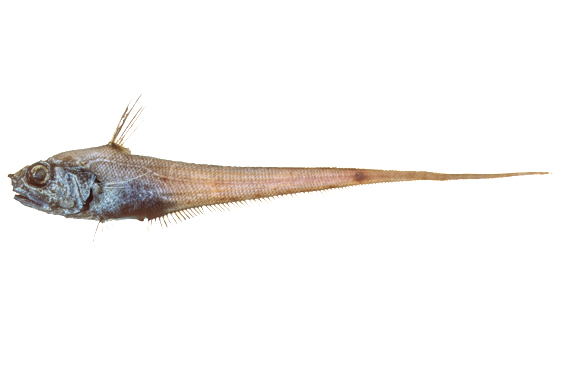McMillan's Whiptail, Coryphaenoides mcmillani Iwamoto & Shcherbachev 1991

McMillan's Whiptail, Coryphaenoides mcmillani. Source: Australian National Fish Collection, CSIRO. License: CC by Attribution-NonCommercial
McMillan's Whiptail, Coryphaenoides mcmillani Iwamoto & Shcherbachev 1991
More Info
|
Distribution |
East of Kiama, New South Wales, to west of Beachport, South Australia, including Tasmania, also off Macquarie Island in the Southern Ocean.Elsewhere the species is southern circumglobal. |
|
Features |
Dorsal fin II, 9-11, Pectoral fin i17-i20, Pelvic fin 8-9, Gill rakers-I (total, outer/inner series) 11-16/16-19, Pyloric caecae 9-10. Body width across pectoral bases about 2 in greatest depth; dorsal profile tapers sharply below first dorsal, then levels off to end of tail. Head short, moderately compressed, length about 5-6 in total length; Snout bluntly pointed; mouth large, upper jaw extends posteriorly to below hind edge of orbit, rictus to midorbit or beyond. Upper jaw teeth in narrow band, with slightly enlarged outer series; lower jaw teeth in single row. A distinct gap at symphysis separating left and right tooth bands of both jaws is present. Outer gill rakers of first arch relatively long and flat, triangular to saber- shaped. Gill openings wide, extending forward to under posterior end of maxillary; Outer gill slit moderately restricted. Rakers on inner series of first arch and in other arches generally shaped somewhat like short, laterally flattened, wide-based clubs, the distal margin of the "clubhead" bristling with sharp needlelike spines. Gill filaments short. Chin barbel rudimentary and stumplike. Head lacking stout ridges of large, modified scales; snout naked except for small tubercular scale at tip and lateral angles. The terminal and lateral snout scutes rather small, each isolated around a broad region of naked skin. Body scales deciduous, about 8- 10 parallel rows of slender, conical spinules. The pyloric caeca is short, fat and directed generally ventrally. No trace of a luminescent organ in CAS paratype, although abdomen between pelvic and anal fins black. Peritoneum ivory but overlain by black pigmentation. Pectoral fin relatively long, but rays fine, none thickened or notably prolonged; First dorsal fin with a sharp spikelike first spinous ray followed by a long compressed ray armed with a sharp ridge of small serrations along leading edge; Second dorsal fin rudimentary over anterior half or so; origin difficult to determine in some specimens because anteriormost rays rudimentary. |
|
Size |
To 34 cm TL |
|
Colour |
In alcohol; overall swarthy, blackish over abdomen behind pelvic fins; operculum and most head membranes black; fins blackish to dusky. |
|
Conservation |
|
|
Species Citation |
Coryphaenoides mcmillani Iwamoto & Shcherbachev 1991, Proc. Calif. Acad. Sci. 47(7): 255, fig. 13. Type locality: 56 km east-northeast of Nowra, New South Wales, Australia, 34°43.95 to 43.98'S, 151°14.74 to 14.28'E. |
|
Author |
Bray, D.J. 2018 |
|
Resources |
McMillan's Whiptail, Coryphaenoides mcmillani Iwamoto & Shcherbachev 1991
References
Iwamoto, T. & Graham, K.J. 2001. Grenadiers (Families Bathygadidae and Macrouridae, Gadiformes, Pisces) of New South Wales, Australia. Proc. Calif. Acad. Sci. 52(21): 407-509, figs. 1-114.
Iwamoto, T. & McMillan, P.J. 2008. Family Macrouridae. pp. 320-347 in Gomon, M.F., Bray, D.J. & Kuiter, R.H. (eds). Fishes of Australia's Southern Coast. Sydney : Reed New Holland 928 pp.
Iwamoto, T. & Shcherbachev, Y.N. 1991. Macrourid fishes of the subgenus Chalinura, genus Coryphaenoides, from the Indian Ocean. Proceedings of the California Academy of Sciences 47(7): 207-233
Iwamoto, T. & Williams, A. 1999. Grenadiers (Pisces, Gadiformes) from the continental slope of western and northwestern Australia. Proceedings of the California Academy of Sciences 51(3): 105-243 figs 1-58

